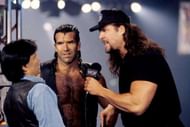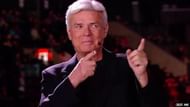
Eric Bischoff will forever be known as the man who climbed the mountain and shoved WWF off the side. Bischoff led WCW to great heights and a part of his philosophy was based on being different than WWF. He has discussed his strategy for competing with WWF in several interviews, his own podcasts, and WWE produced documentaries.
Bischoff has stated that his goal was to be different than WWF. He didn’t want to try and match them at what they did, so he decided to target a different market than WWF was targeting at that time. WWF was geared more toward children with outlandish characters, whereas WCW shifted directions and began using real names and targeted an older demographic.
With that in mind, here are some occasions when WCW’s realism blurred the lines between entertainment and reality, for some viewers.
10 WWE Stars Who Are Now Banned - Find Out Now!
#3 The Outsiders invade WCW

Scott Hall showed up unannounced on WCW television. He was wearing street clothes (although you should never wear that much denim on the streets) and his famous “you know who I am” promo felt like something real was unfolding before our eyes. Also keep in mind, in 1996, fans were not as aware of the scripted nature of professional wrestling, as they are today.
Scott Hall and Kevin Nash kept showing up, no longer going by the colorful gimmicks they had in WWF (Razor Ramon and Diesel), but now they were going by their real names. Bischoff was able to orchestrate one of the most realistic storylines in professional wrestling history with the “Outsiders” invading WCW.
Eventually, the nWo program led to the infamous backstage attack on Nitro in which the members of the nWo attacked WCW wrestlers with a level of violence and realism that had not been seen before.
Fans watching at home who lived in the local area actually called 911. Here is Eric Bischoff’s account from his podcast about the incident:
“It is true. It was something that I didn’t think about. It’s not like I was sleeping at the wheel or was too busy, but I never would have anticipated that you could do something on a wrestling show that was so believable where people sitting at home would call the cops in the local market, but that was exactly what happened … Sure enough, we had Orlando cops showing up on set because people called 911. They thought there was a murder going on backstage because they had never seen anything like it. It was so believable, it just didn’t look like a pro wrestling angle. It was everything. You didn’t see ambulances, or anything remotely close to this scene before. You may have kind of in a way similar but not executed like this or produced as well. The thing that made it was when took off Rey’s mask, because in a real situation, if his skull was cracked they wouldn’t be able to treat it with a mask on. It was the little details that made it believable.
There were a lot of little details that made it work, but I think the one big detail was when Chris Benoit, Arn Anderson, I mean, Miss Elizabeth crying. Everybody broke character and they were so into the moment and made it believable. They didn’t have some 22 year old j—off writing a script who has never been laid or been in a fight and is now suddenly in charge of a wrestling show, which is the case nowadays, you know. They knew what the scene was going to be and what the message was and what we were trying to create, but they had to improv it. They relied on their talent and instincts to make it believable. They made it so believable that it allowed them to get into the character. They literally became actors and actresses in this scene, like legitimately good ones across the board.”
-Eric Bischoff, 83 Weeks Podcast
Transcript via WrestlingInc.com
#2 Eric Bischoff fires referee, Randy Anderson

At Souled Out 1997, bad guy referee Nick Patrick was knocked out and there was no one to make the count for the Steiners. That’s when WCW ref, Randy Anderson came rushing in from the crowd to make the count, awarding the titles to the Steiner Brothers.
The problem for Anderson?
He just helped the Steiner Brothers take the titles from the nWo team of the Outsiders. There would be a penalty to pay. The next night on Nitro, Eric Bischoff fired Randy Anderson in egregious fashion.
Bischoff: “I know you that you had a tough year...”
Anderson: “My bout with cancer…”
Bischoff: “I don’t want to hear about your personal problems! I know that you had a tough year, but under the circumstances I have no other choice, you are hereby terminated.”
The following week, Anderson showed up with his family begging for his job back. In what some consider to be one of the most entertaining segments in WCW history, Bischoff asked Anderson’s children to tell their father that he is still fired.
An Executive Call
The day after Anderson’s on-air “termination”, Bischoff received a call from an executive at Turner Broadcasting asking why Turner’s Human Resources department was flooded with calls about Bischoff unfairly terminating an employee the previous night.
At first, Bischoff was confused, he explained on a recent episode of his podcast, because he had not actually fired anyone. As it turned out, members of Randy Anderson’s church were watching Nitro and were horrified to see the public humiliation of their fellow worshiper, who had just finished a battle with testicular cancer.
#3 Using Ric Flair’s real-life hatred for Bischoff as part of a story

Ric Flair played an integral part in bringing Hulk Hogan on board with WCW. Flair knew he would be giving up his role as the face of the franchise once the Hulkster was running wild, but he put his ego aside and still helped arrange a meeting between Eric Bischoff and Hulk Hogan.
Flair had issues with booking decisions and how the Horsemen were relegated to a B squad stable next to the nWo. The real insult came during the infamous speech Bischoff gave to the locker room in which he told the roster that only three of them had ever drawn any money, and that list did not include Ric Flair.
Ric Flair was scheduled to be at a taping a Thunder on April 9, 1998. Flair insisted that he had given them advanced notice that he would not be there. WCW, however, didn’t get the memo, as they were forced to improvise while Flair attended his sons’ AAU Championship Tournament.
Eric Bischoff and WCW filed a lawsuit against Flair for not making his appearance. He wasn’t seen again on WCW television until September of that year, when he made his epic return. The night saw him reform the Horsemen and tear into Eric Bischoff.
The real emotions involved in this promo helped make this one of the very best of Flair’s legendary career. It didn’t stop with that one promo; the feud lasted for months and led to even more classic promos.
Make Sportskeeda your preferred choice for WWE content by clicking here: Source preferences

